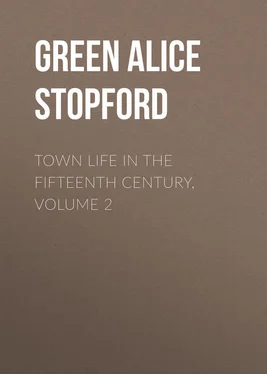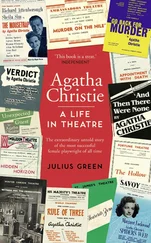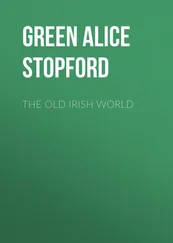Alice Green - Town Life in the Fifteenth Century, Volume 2
Здесь есть возможность читать онлайн «Alice Green - Town Life in the Fifteenth Century, Volume 2» — ознакомительный отрывок электронной книги совершенно бесплатно, а после прочтения отрывка купить полную версию. В некоторых случаях можно слушать аудио, скачать через торрент в формате fb2 и присутствует краткое содержание. Жанр: literature_19, foreign_antique, foreign_prose, Историческая проза, на английском языке. Описание произведения, (предисловие) а так же отзывы посетителей доступны на портале библиотеки ЛибКат.
- Название:Town Life in the Fifteenth Century, Volume 2
- Автор:
- Жанр:
- Год:неизвестен
- ISBN:нет данных
- Рейтинг книги:5 / 5. Голосов: 1
-
Избранное:Добавить в избранное
- Отзывы:
-
Ваша оценка:
- 100
- 1
- 2
- 3
- 4
- 5
Town Life in the Fifteenth Century, Volume 2: краткое содержание, описание и аннотация
Предлагаем к чтению аннотацию, описание, краткое содержание или предисловие (зависит от того, что написал сам автор книги «Town Life in the Fifteenth Century, Volume 2»). Если вы не нашли необходимую информацию о книге — напишите в комментариях, мы постараемся отыскать её.
Town Life in the Fifteenth Century, Volume 2 — читать онлайн ознакомительный отрывок
Ниже представлен текст книги, разбитый по страницам. Система сохранения места последней прочитанной страницы, позволяет с удобством читать онлайн бесплатно книгу «Town Life in the Fifteenth Century, Volume 2», без необходимости каждый раз заново искать на чём Вы остановились. Поставьте закладку, и сможете в любой момент перейти на страницу, на которой закончили чтение.
Интервал:
Закладка:
112
Many merchants of Lynn were made freemen of Canterbury and also admitted to the Brotherhood of the Monastery, by letters of fraternity which gave them a share in certain spiritual benefits. Is it possible that any trading privileges were connected with this?
113
As far away as Nottingham oxen and sheep were forestalled and sold to butchers of London. Nott. Rec. iii. 48.
114
Leet Jurisdiction of Norwich (Selden Soc.), lxxiv.
115
Select Pleas of the Crown (Selden Soc.), 88-9.
116
Case of the Abbot of Westminster against Southampton. Rot. Parl. i. 20-21. Trial before the King’s Bench at Westminster in 1201 where the Burgesses of Northampton claim that unjust toll is taken from them by the Abbot of Thorney, which he defends by virtue of custom and an older charter than Northampton. Select Civil Pleas (Selden Soc.), i. 11. See a case at Plymouth, 1495; Hist. MSS. Com. ix. 273. Leicester and Nottingham; Ibid. viii. 416-417. Southampton and Bristol; Report on Markets, 56. Winchester; Ibid. 55. See also Ibid. 62; Gross, ii. 257-8; 177-182; 147; 379. A merchant from the Cinque Ports who insisted on the privilege of burgesses to pay no toll with regard to some wool in Blackwell Hall, in the time of Henry the Eighth, had to defend his rights and won his case.
117
Retaliation in taking of toll is expressly mentioned in the charter of London. Stubbs’ Select Charters, 104.
118
1238. Gross, ii. 173-174.
119
Gross, ii. 256.
120
Hist. MSS. Com. xi. 3, p. 16. For agreement between Southampton and Portsmouth 1239, Marlborough 1239, Bristol 1260, Netley Abbey 1288, Bishop of Winchester 1312, Lymington 1324, New Sarum 1329, Coventry 1456, see Davies’ Southampton, 225-228; Abbot of Westminster Rot. Parl. i. 20-21. Other instances Rep. on Markets, 40-41. Select Civil Pleas (Selden Soc.), i. 11. Nottingham Rec. i. 55, ii. 349, 362. Gross, ii. 389-90, Hist. MSS. Com. ix. 212.
121
Journ. Arch. Ass. xxvii. 416-7. When a gun was made for Lydd, metal for it was bought at Winchelsea and Hastings. (Hist. MSS. Com. v. 516-517, 521.) The Nottingham founder sent to Lincolnshire for his bell metal. (Nott. Rec. ii. 143, 145).
122
Ibid. ii. 179; iii. 19, 21, 29.
123
Hist. MSS. Com. viii. 414.
124
Select Pleas of the Crown (Selden Soc.), i. 89. Rep. on Markets, 50-52.
125
See Calendar of Letters from Corporation of London. 1350-1370, ed. by Dr. Sharpe.
126
Piers Ploughman. Pass vii. 250.
127
These can be traced from 1285 to the time of James I.; they were probably Jews who had come with the Conqueror and were allowed to get land. Survey of Birmingham, 50.
128
For example William Hollingbroke of Romney, whose wife Joanna sold blankets in 1373, was one of the members sent to Parliament and headed the list of taxpayers in a ward named after him Hollingbroke Ward from 1384 till 1401. Then his widow took his place till she retired from business in 1404, and the once opulent family, for a time represented by a single trader Stephen, seems finally to have become extinct in 1441. The chief position in local trade then passed to the Stuppeneys who settled in the town in 1436 and whose local fame is still recalled by the fact that even now the yearly election of the Mayor of Romney takes place in the church of S. Nicholas at the tomb of one of them who was Jurat of the town.
129
Hist. MSS. Com. v. 523-531.
130
Between 1353 and 1380. Ibid. vi. 545. Ibid. iv. 1, 424-8. Ibid. v. 533. The mayor of Liverpool, who in 1380 had property to the value of £28 6 s. 4 d. , made up of domestic utensils, grain in store, wheat sown, nine oxen and cows, six horses, and eighteen pigs, was no doubt a very rich man in his own borough. Picton’s Mem. Liverpool, i. 30.
131
Hist. MSS. Com. v. 534, 535, 536, 539, 541-3.
132
Piers Ploughman. Pass. iv. 83. A prosperous cook at Oxford in 1400 married his daughter to one Lelham “Dominus de Grove.” By the marriage contract the cook was to give to Lelham twenty marks to be paid at intervals; to the bride and bridegroom he was to give three tenements in Oxford; he was to make provision for them in his own house for eight years, and when after that they were to be set up in a house of their own he was to provide them with a bed, blankets, sheets, and all other furniture needful for the same bed, a vessel for water, a wine vase, two tablecloths, two towels, twelve silver spoons, two cups, two brass pots, one chawfre, four plates, one dozen vessels for garnishing the supper, two salts, two candle-sticks. Hist. MSS. Com. xi. 3, 75-6.
133
See Nott. Rec. iii. 74-76, 342, 353, 358-60, 461, 463. The holding offices of all kinds by victuallers and brewers was forbidden (Stat. 12, Ed. II. cap. 6. 6 Ri. II. st. 1, cap. 9, H.M.C. ix. 174, xi. 3, 19), as a protection to the people from fraudulent administration of the laws concerning food; but these statutes were everywhere broken.
134
(See pp. 352-3.)
135
H.M.C. ix. 173-4.
136
According to Thorold Rogers (Agric. and Prices, iv. 502-5) about 20 per cent. in excess. Skilled workmen, such as architects, artists, trained clerks, &c., were paid at very modest rates, though sometimes they were given honour by being boarded as gentlemen.
137
Statutes, 12 Richard II. cap. 3.
138
Riley’s Liber Albus, 261-2.
139
For particulars of truck wages see Stat. 4 Edward IV. cap. 1. This payment on the truck system was spoken of as a new thing in the middle of the fifteenth century (Wright’s Political Songs, ii. 285), and is referred to in Libel of English Policy. It was forbidden by town ordinance in Winchester and Worcester. (English Guilds, 352, 383.)
140
Piers Ploughman. Pass. vii. 213-14.
141
Piers Ploughman. Passes vii. 215-249.
142
For a description of the various deceits practised in cloth-making see 3 Richard II. stat. cap. 2. Stat. of Westminster 7 Richard II. cap. 9; 15 Richard II. cap. 10. In 1221 the jurors of Worcester were already complaining that the assize of the breadth of cloth was not observed. Select Pleas of the Crown, Selden Soc. 97.
143
Piers Ploughman. Pass. i. 33-4.
144
Hist. MSS. Com. ix. 259; xi. 3, 70-73, 111. Davies’ Southampton, 82. Hunt’s Bristol, 74, 97-8.
145
Survey of Birmingham, 50, 51, 52. See above, p. 63.
146
Journ. Archæol. Ass. xxvii. 110-148. This as one among many proofs tends to show how wealth was passing not so much to the mere land-owners as to the new tenants who were combining the cloth trade with big sheep farms – the enterprising speculators who were on the watch for the cheap lands of ruined lords to increase their own business.
147
Members of the Pepperers Company began to replace the Jews at the King’s exchange in the thirteenth century (Kingdon’s Grocers’ Company, i. x-xii.)
Читать дальшеИнтервал:
Закладка:
Похожие книги на «Town Life in the Fifteenth Century, Volume 2»
Представляем Вашему вниманию похожие книги на «Town Life in the Fifteenth Century, Volume 2» списком для выбора. Мы отобрали схожую по названию и смыслу литературу в надежде предоставить читателям больше вариантов отыскать новые, интересные, ещё непрочитанные произведения.
Обсуждение, отзывы о книге «Town Life in the Fifteenth Century, Volume 2» и просто собственные мнения читателей. Оставьте ваши комментарии, напишите, что Вы думаете о произведении, его смысле или главных героях. Укажите что конкретно понравилось, а что нет, и почему Вы так считаете.












